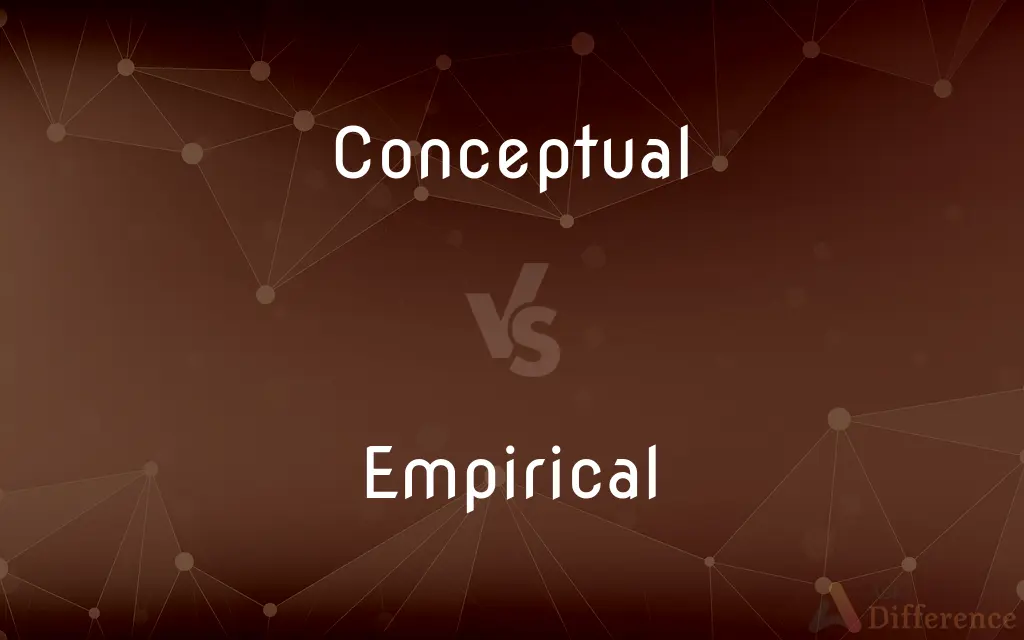Conceptual vs. Empirical — What's the Difference?
By Fiza Rafique & Urooj Arif — Updated on April 18, 2024
Conceptual research involves abstract ideas and theories, focusing on understanding concepts, while empirical research relies on observable and measurable evidence to validate hypotheses.

Difference Between Conceptual and Empirical
Table of Contents
ADVERTISEMENT
Key Differences
Conceptual research primarily deals with abstract ideas and the development of theories, using logical reasoning to explore and define phenomena. In contrast, empirical research is grounded in real-world data collection and experimentation, emphasizing the verification of theories through sensory experience and measurement.
In conceptual studies, the approach is often qualitative, involving the systematic theoretical analysis of phenomena. Whereas empirical research typically involves quantitative methods, using statistical techniques to analyze data and draw conclusions.
Conceptual researchers might engage in thought experiments, theoretical modeling, or philosophical argumentation to advance knowledge in their fields. On the other hand, empirical researchers conduct experiments, surveys, and case studies to gather factual data that can be observed and assessed.
The outcomes of conceptual research are usually insights that broaden understanding of a concept or theory, often influencing the direction of further empirical research. Conversely, the results of empirical research provide direct, practical applications and evidence-based conclusions that can impact real-world scenarios.
Conceptual research is indispensable for the development of new ideas and frameworks that later can be tested through empirical methods. Empirical research, however, is crucial for validating these concepts and ensuring their applicability in practical settings.
ADVERTISEMENT
Comparison Chart
Basis of research
Theories and ideas
Observable and measurable evidence
Primary method
Qualitative analysis
Quantitative methods
Focus
Understanding and expanding concepts
Testing hypotheses
Data Type
Non-observable data (ideas, theories)
Observable data (experiments, surveys)
Outcome
Theoretical advancements
Practical, evidence-based conclusions
Compare with Definitions
Conceptual
Often philosophical or theoretical.
The book's conceptual analysis of freedom expanded traditional definitions.
Empirical
Can be quantitative or qualitative.
She used empirical methods, including surveys and interviews, to gather data.
Conceptual
Focused on ideas and theories.
The study was conceptual, exploring the dimensions of human behavior through theoretical frameworks.
Empirical
Based on direct or indirect observation.
His empirical research on climate change included extensive data collection.
Conceptual
Involves abstraction and logic.
Her conceptual approach to social justice involved defining key terms and ideologies.
Empirical
Relies on measurable evidence.
The study's empirical findings supported the new treatment's effectiveness.
Conceptual
Does not require empirical evidence.
The conceptual model was developed without direct data but through extrapolation from existing theories.
Empirical
Involves collecting new data.
The empirical study involved a series of controlled experiments.
Conceptual
Aids in hypothesis creation.
The conceptual discussion helped formulate hypotheses for future testing.
Empirical
Results in verifiable findings.
The empirical data clearly showed a trend towards increased urbanization.
Conceptual
Relating to or based on mental concepts
Philosophy deals with conceptual difficulties
Empirical
Relying on or derived from observation or experiment
Empirical results that supported the hypothesis.
Conceptual
Of or relating to concepts or mental conception
Conceptual discussions that antedated development of the new product.
Empirical
Verifiable or provable by means of observation or experiment
Empirical laws.
Conceptual
Of or relating to conceptualism.
Empirical
Guided by practical experience and not theory, especially in medicine.
Conceptual
Of, or relating to concepts or mental conception.
We defined a conceptual model before designing the real thing.
Empirical
Pertaining to or based on experience .
The lengths were calculated according to the empirical rules of the trade.
For some presumptive diagnoses, empirical antibiotic therapy begins immediately, whereas specific antibiotic therapy must await the results of the culture and sensitivity test.
Conceptual
Of or relating to conceptualism.
Empirical
Pertaining to, derived from, or testable by observations made using the physical senses or using instruments which extend the senses.
Conceptual
Pertaining to conception.
Empirical
(philosophy of science) Verifiable by means of scientific experimentation.
Demonstrable with empirical evidence
Conceptual
Being or characterized by concepts or their formation;
Conceptual discussions
The schizophrenic loses ability to abstract or do conceptual thinking
Empirical
Derived from experiment and observation rather than theory;
An empirical basis for an ethical theory
Empirical laws
Empirical data
An empirical treatment of a disease about which little is known
Empirical
Relying on medical quackery;
Empiric treatment
Common Curiosities
How does empirical research use statistics?
Empirical research often uses statistical methods to analyze collected data, helping to establish patterns, relationships, and causality.
Can conceptual research be considered scientific?
Yes, conceptual research is considered scientific when it systematically explores and elaborates on theories that contribute to academic fields, though it does not involve empirical data collection.
How does one validate the findings from conceptual research?
Findings from conceptual research are validated through logical consistency, coherence with existing knowledge, and sometimes through subsequent empirical testing.
What role does reasoning play in conceptual research?
Reasoning in conceptual research is critical for forming logical connections between ideas and developing theories without the need for physical data.
Is empirical research limited to natural sciences?
No, empirical research is also prevalent in social sciences, psychology, economics, and many other fields where observational or experimental data can be collected.
What is an example of empirical research in psychology?
An example would be conducting experiments or surveys to test the effectiveness of cognitive-behavioral therapy on depression.
What tools are commonly used in empirical research?
Common tools include statistical software, laboratory equipment, surveys, and various forms of measurement instruments.
Can empirical research influence public policy?
Yes, empirical research can provide evidence-based recommendations that inform and shape effective public policy.
How do researchers ensure the reliability of conceptual research?
Reliability in conceptual research is ensured through thorough literature review, consistent logic, and peer review.
Why is replication important in empirical research?
Replication is crucial to verify the reliability and generalizability of empirical research findings across different samples and contexts.
How are hypotheses used differently in conceptual vs. empirical research?
In conceptual research, hypotheses may guide the development of theory, while in empirical research, hypotheses are directly tested against observed data.
What distinguishes a conceptual paper from an empirical paper in academic publishing?
A conceptual paper focuses on developing arguments and theories without new data, while an empirical paper presents original research findings based on new data.
How does technology impact empirical research?
Technology enhances empirical research by providing more precise tools for data collection, analysis, and presentation, thereby improving the accuracy and efficiency of research processes.
How can conceptual and empirical research complement each other?
Conceptual research can propose new theories that empirical research tests, and empirical findings can also suggest modifications to existing theories.
What ethical considerations are unique to empirical research?
Empirical research often involves specific ethical concerns, such as ensuring informed consent, maintaining participant confidentiality, and managing potential harm to subjects.
Share Your Discovery

Previous Comparison
Ecg vs. Echocardiography
Next Comparison
Questionnaire vs. InterviewAuthor Spotlight
Written by
Fiza RafiqueFiza Rafique is a skilled content writer at AskDifference.com, where she meticulously refines and enhances written pieces. Drawing from her vast editorial expertise, Fiza ensures clarity, accuracy, and precision in every article. Passionate about language, she continually seeks to elevate the quality of content for readers worldwide.
Co-written by
Urooj ArifUrooj is a skilled content writer at Ask Difference, known for her exceptional ability to simplify complex topics into engaging and informative content. With a passion for research and a flair for clear, concise writing, she consistently delivers articles that resonate with our diverse audience.















































